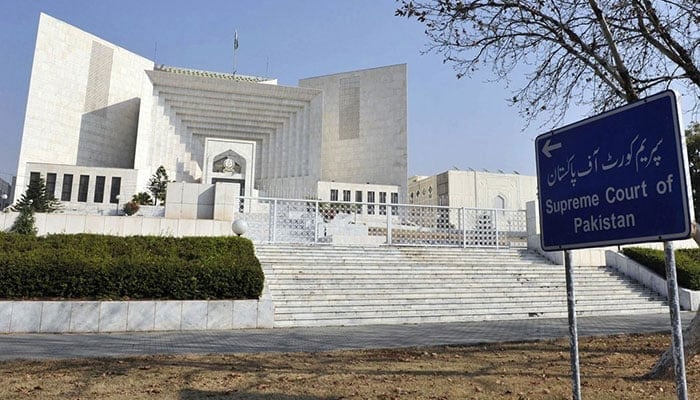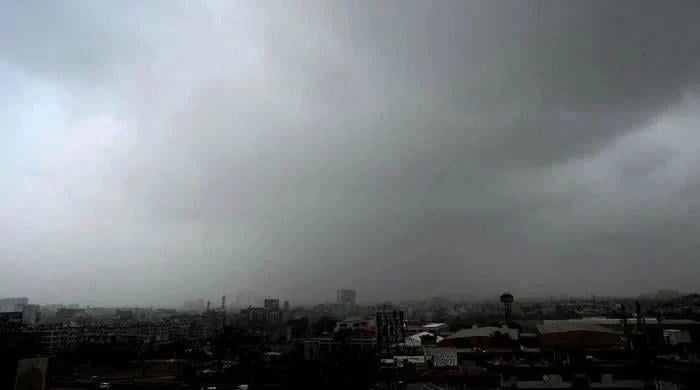Amendment made to Elections Act cannot undo judgment on reserved seats: SC
ECP "bound to implement judgment" passed by Supreme Court without seeking any further clarification
October 18, 2024

- Top court issues second clarification on the requests of ECP and PTI.
- Judgment of this court…should have been implemented: SC.
- "No further clarification is required to be issued," states apex court.
ISLAMABAD: The Supreme Court has reiterated that parliament's amendment to the Elections Act does not have a retrospective effect and it cannot undo the top court's judgment in the reserved seats case.
The second clarification comes after the Election Commission of Pakistan (ECP) and the Pakistan Tehreek-e-Insaf (PTI) separately approached the apex court last month, seeking a clarification on its order to grant reserved seats to the Imran Khan-founded party.
The top court declared on July 12 that the embattled PTI was eligible for seats reserved for women and minorities. However, the government passed an amendment to the Election Act, 2017, forcing the ECP to seek clarification from the top court.
In response, the apex court's judges, who issued the order, stressed that the request was "misconceived" and ordered the poll organising authority to follow through on the verdict.
Then, the court on September 23 issued a detailed verdict declaring the PTI a parliamentary party, stating that 39 of the 80 MNAs are affiliated with the PTI, while the remaining 41 have the chance to resubmit their party affiliations.
However, despite the court's clarification and the detailed verdict, the ECP has yet to allot reserved seats to the PTI.
The ECP, in its civil miscellaneous application (CMA), submitted that the top court’s short order was based on the law which has since been altered by the amendments made to Sections 66 and 104 of the Elections Act, 2017 and a new Section, namely 104-A, has also been inserted with retrospective effect from the date of the commencement of the act, the SC stated in the clarification.
On the other hand, PTI submitted in its CMA that the short order passed by the SC was based on the interpretation and enforcement of constitutional provisions, therefore the amendments cannot supplant the effect of the short order, it added.
“The court [SC] granted the relief in the short order to enforce the right of the electorate through political parties to have proportional representation in the reserved seats under paragraphs (d) and (e) of clause (6) of Article 51 and paragraph (c) of clause (3) of Article 106 of the Constitution, therefore, the amendments made in the Elections Act after the release of our short order will have no bearing and the Commission is bound to implement the judgment passed by the Supreme Court of Pakistan, in its letter and spirit, without seeking any further clarification.
‘Dilatory tactics’
In its previous clarification on September 14, the top court had come down hard on the ECP for its “attempts to create confusion” on its July 12 reserved seats verdict, saying that the clarification sought by the commission was nothing but an attempt to “obstruct implementation” of the judgment declaring PTI eligible for reserved seats in parliament.
“Putting together the record placed before us [top court], and considering the same in light of the short order, leaves in little doubt that the clarification sought by the commission is nothing more than a contrived device and adoption of dilatory tactics,” the eight judges had stated in the clarification.
In its four-page clarification, the SC said having itself issued notices to the PTI through Barrister Gohar Ali Khan as its Chairman, the Commission “gave recognition to both the party and the office holder”.
On September 23, hours after the SC issued a detailed verdict of the reserved seats case wherein the PTI was declared eligible for seats in assemblies, Law Minister Azam Nazeer Tarar reiterated that decision of joining any political party by independents is "irreversible", saying that the Imran Khan-founded party was not even a petitioner in the case.
“Legal question still remains in place […] the detailed judgment didn’t interpret how the reserved seats will be allocated to the party as per the current regulations,” the minister had said.
The law minister had said Articles 51 and 106 of the Constitution warrant that independents will have to join a political party within three days of the publication in the official Gazette of the names of the returned candidates.
Tarar had said parliament has amended the Sections 66 and 104 (a) of the Election Act, which is now the existing law in the country.
Referring to the PTI-backed returned candidates, the minister had said the independents, who have already joined the Sunni Ittehad Council, cannot join any other party, adding that parliament is fully empowered to make or amend laws.
In its 70-page judgment issued today, the apex court had termed the PTI "a political party" and eligible for the seats' quota. It stressed that the lack of an electoral symbol does not affect its constitutional right to take part in elections.









